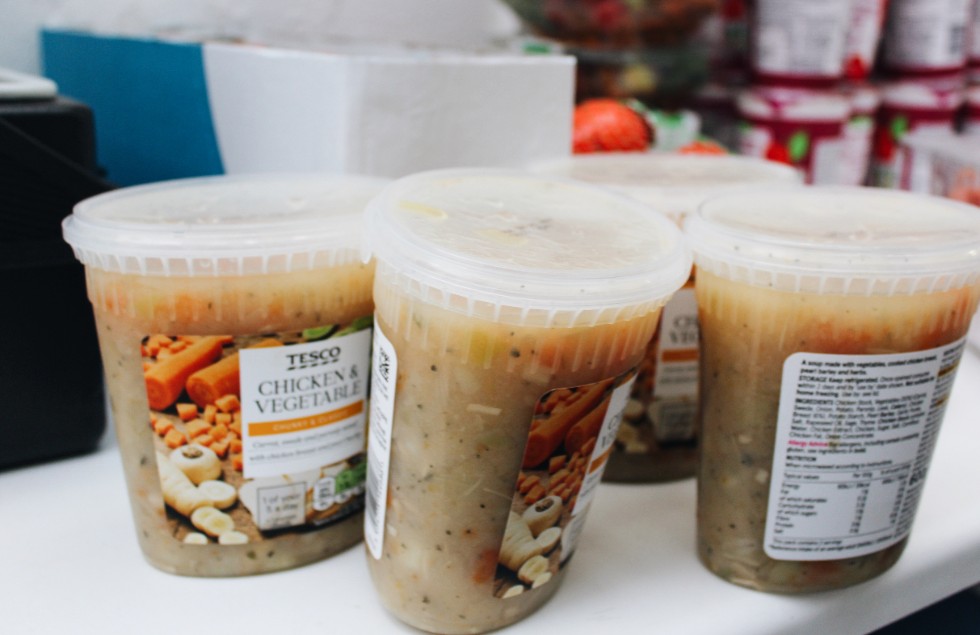Nutritionist, Jayne Davis, shares advice on how to maintain a nutritious diet on a budget
When it comes to eating healthy or going hungry, many don’t have a choice. However, eating well doesn’t have to cost a fortune. Following these tips will make you and your budget feel good
What types of food should we avoid or moderate?
No food group should be avoided within a balanced diet. However, foods high in saturated fat, salt and sugar should be only consumed infrequently and in small amounts.
What types of foods should we seek out?
Where possible, you should always try to eat fresh fruits and vegetables that are in season and limit highly processed foods high in sugar, salt and saturated fats.
How can we have a healthy diet on a budget?
A good way of doing this is to plan meals in advance, write a shopping list and stick to it. Cooking in bulk is also a great way to not only always have a meal in the fridge or freezer, but also save money. Buying your own ingredients and cooking from scratch may be a bit more time consuming, but it will be cheaper and healthier than buying ready meals that are often high in salt and sugar and are lacking in nutrients. Preparation is key.
Where to find help managing food insecurity
In this difficult time, know there are organisations out there that can ease the burden
The Trussell Trust runs the largest network of food banks in the United Kingdom, with 32 centres in communities across Wales.
They work with nutritionists to develop emergency food parcels that contain sufficient nutrition for at least three days of healthy, balanced meals.
More than 40,000 volunteers work to sort non-perishable and in-date food that is donated by the public via donation stations in supermarkets, businesses, churches and schools.
However, the Trussell Trust provides more than food parcels. The organisation also works with healthcare professionals and social services to provide emotional support for those in crisis, as well as the tools to resolve the crises that they face.
In order to access help from the Trussell Trust, you will need a referral. You’ll then be given a food voucher which can be spent at your local food bank centre. Once you arrive, you will be welcomed by trained volunteers who will sit with you to discuss your needs, provide an emergency food parcel and find support to resolve the difficulties that led to food insecurity.
Are you in crisis and want to talk? These helplines and listening services can help.
Campaign Against Living Miserably: 0800 58 58 58
Samaritans: 116 123
Community Advice and Listening Line: 0800 132 737
Cardiff Food Bank: 02920 484 120
Pontypool Food Bank: 01495 760605
A food bank diet diary
As it turns out, a student can only cope with so much plain pasta
In order to better understand the experiences of those in food crisis, Chelsea embarked on a three-day food bank diet. From a shopping list given by the Trussell Trust, Chelsea went to the supermarket to buy those products found in an emergency food parcel. Here’s what she thought about the variety of foods, taste and nutrition.
As the number of people in food crisis increases in South Wales, we ask if there’s a choice when it comes to hunger versus health
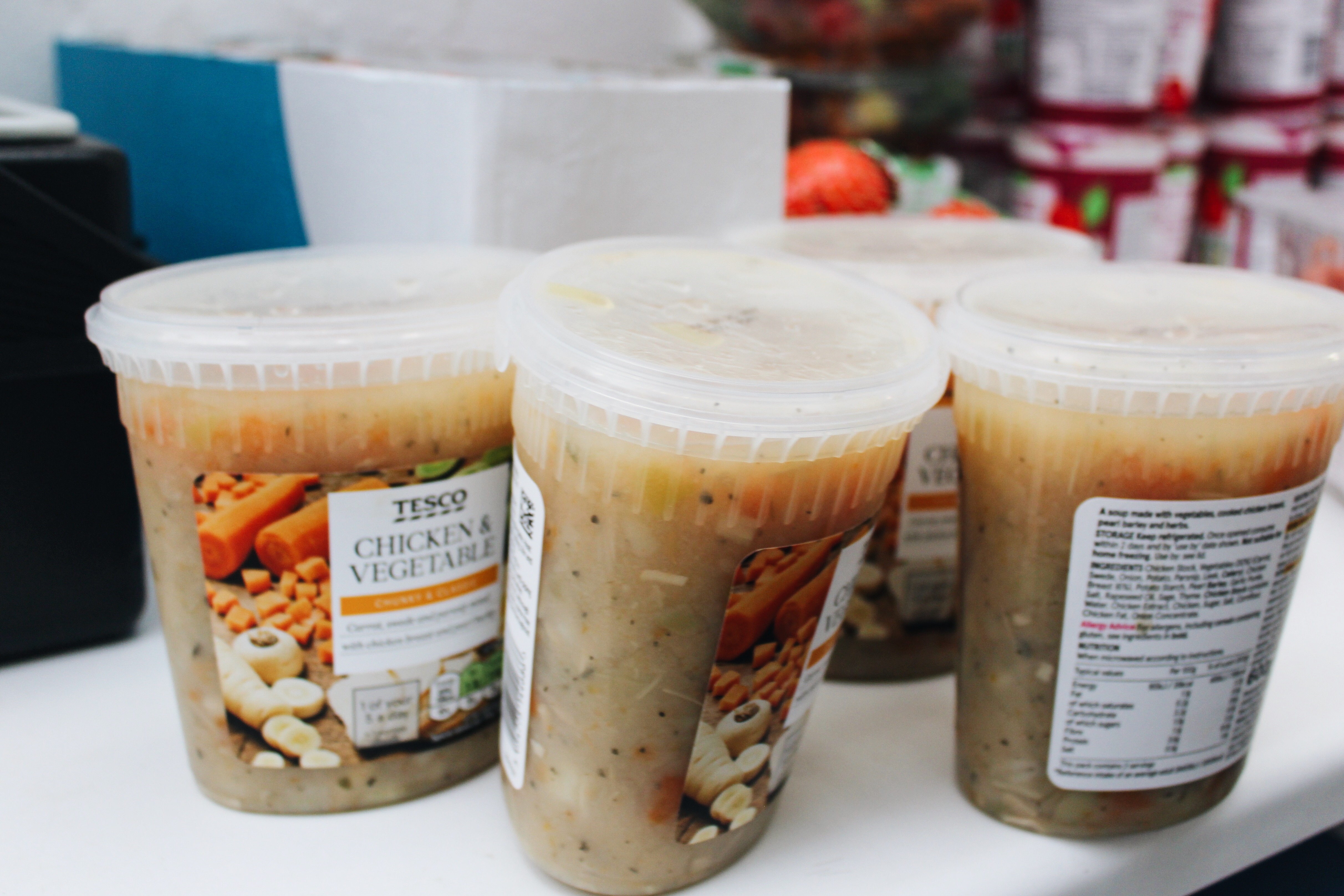
The morning starts with a crate of chicken soup. Not tins, no dented aluminium; nor the kind found in the depths of a cupboard and saved for a harvest food hamper. We’re talking plastic tubs with tasteful photography from the chilled section of a supermarket.
“Everything has to be logged before it gets put away,” says Dawn Tattershall, a volunteer at the food cooperative in Griffithstown.
The soup in question comes from Fare Share, a scheme that distributes surplus food to food cooperatives, community-driven charities that fight hunger and tackle waste by creating discounted parcels for those in need.
Dawn sorts through the boxes stacked around her. She and two volunteers are emptying the white van idling outside the shop on Windsor Road.
“We charge £4.00 for a bag of food and you’re entitled to up to three,” says Dawn, counting a stack of honey-cured ham like a deck of playing cards. The parcels are bulging; as much as can be squashed into a bag for life. There’s easily £25.00 worth of products in each one, enough to make meals for a few days. Dawn explains how the demand for the service is increasing now that the shop is on social media and more people know it exists. “I think we gave out nearly 50 bags in a week once,” she says.
“Add the rising cost of living, mix with wage stagnation and you have a recipe for crisis.”
Dawn says that last week, they received a box of feta cheese among other things in their delivery. “We had mushrooms, turkey rashers, sausages, chicken, steaks…” It’s not the processed goods many expect from a food cooperative.
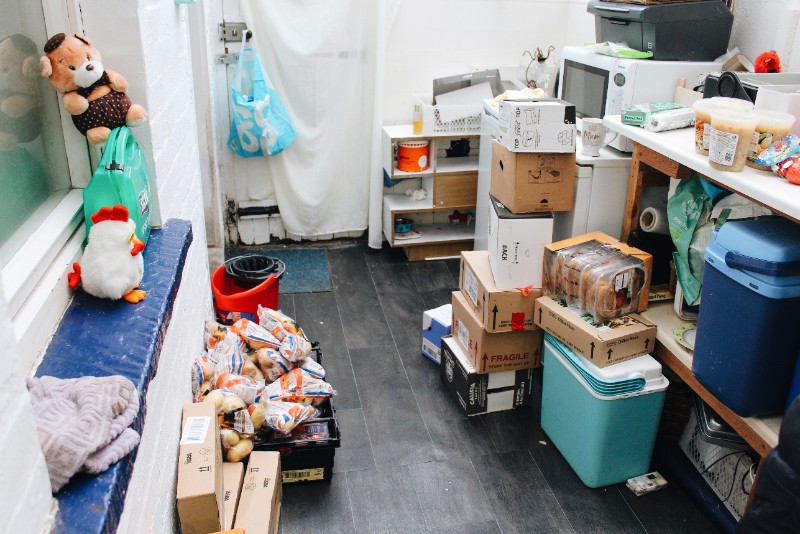
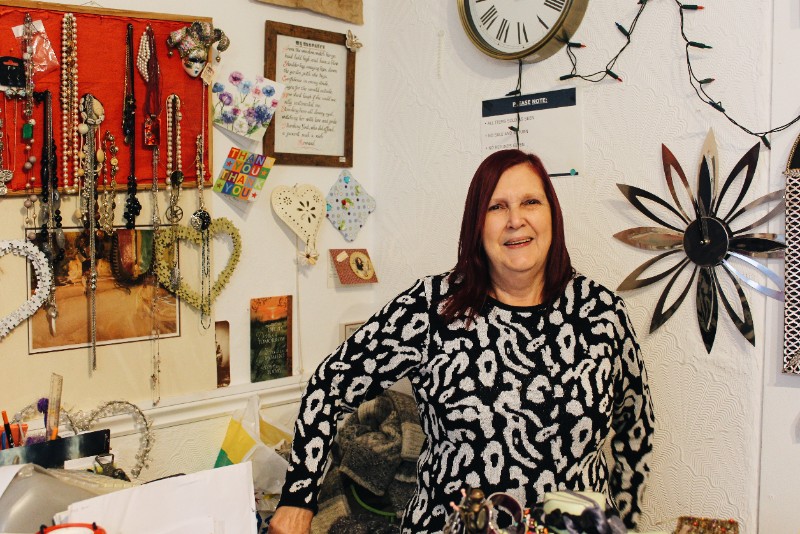
A country in crisis
In the United Kingdom, the number of people receiving food aid has grown by 73% in five years. In Wales, 113,373 emergency food parcels were distributed between 2018-19 and according to a recent report, a fifth of the population worry about food insecurity.
Largely, food poverty is a result of changes to welfare. Add the rising cost of living, mix with wage stagnation and you have a recipe for crisis.
Emma Revie, chief executive of the Trussell Trust – a charity aiming to end hunger with the largest national network of food banks – says, “People are being locked into extreme poverty and pushed to the doors of food banks. Hunger isn’t about food. People are trying to get by on £50.00 a week and that’s not enough for the essentials.”
Essentials are defined as things that are absolutely necessary. These differ; one man’s bread is another’s brioche. However, according to nutritionist Jayne Davis, we all need a balanced mix of protein, carbohydrates, fats and micronutrients in order to maintain a healthy diet.
“It’s recommended that individuals follow the Eatwell Guide,” says Jayne. This is a government-produced visual representation of the food groups. “Choosing a variety of foods from each group will allow us to achieve the range of nutrients our bodies require to stay healthy and function correctly.”
When the choice is heating or eating, what becomes essential?
Feeding those in need
Typically, an emergency food parcel consists of non-perishables. Food cooperatives differ – think of it like a surplus food subscription; cooperatives pay redistribution charities a fee who then provide excess produce donated by supermarkets.
“It comes down to the supply and suppliers,” Paula Cotton, owner of the cooperative, says around an armful of pasta sauce. “They can only give what they get. It’s hard, people can’t pick and choose but they’re grateful.”
Paula puts down the crate. Bolognese, from the look of it. “Whatever we get, we try and give a variety,” she explains. Paula works to create parcels that mix fresh with packaged products.
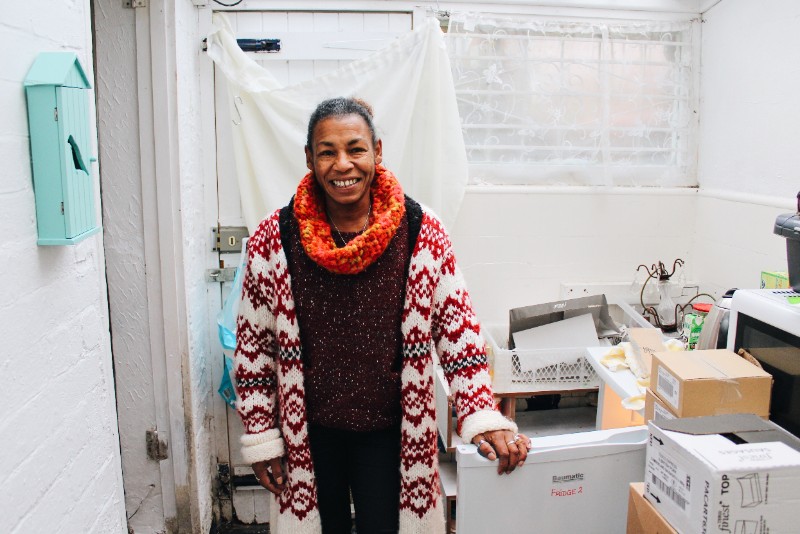
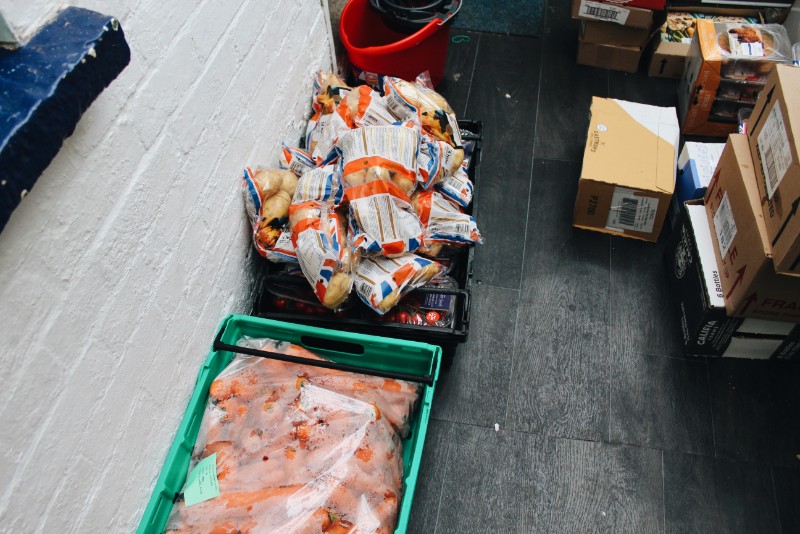
“One of the most notable benefits of consuming a balanced diet is its effect on our energy levels,” says Jayne. “If we don’t consume the appropriate nutrients throughout the day, it can leave us feeling lethargic.”
“This means that a healthy diet costs £103.00 per week for a family of four.”
Yet, for those experiencing food insecurity, nutrition is of least concern with 70% of customers at the food cooperative agreeing that keeping costs low was a priority when buying groceries. A consistent diet of quality, nutrient-rich fresh foods is unattainable when relying on food banks as they, unlike the cooperative, are unable to store perishables.
“They’re not given the choice, it’s snatched away,” says Paula, shaking her head.
If you compare the cost of following the Eatwell Guide with average household incomes in Wales, the bottom 20% of families would need to spend 36% of that income on food. This means that a healthy diet costs £103.00 per week for a family of four.
One customer of the cooperative, a mother of two, speaks of the struggle to cook tasty meals on a food bank diet. She says, “We were grateful, obviously. It was better than nothing which was all I could afford at the time. I like coming here though because I love the variety of items. It’s much easier to make meals and I feel like what we get is healthy because a lot of it’s fresh.”
Combating food insecurity
Although not perfect, food banks and cooperatives ease the strain of food insecurity and do their best to ensure those in need receive healthy options when possible.
“We try,” says Paula. “It’s not always the best option. We try.” She reaches around Dawn, organising the chicken soup into a tower before unboxing several packets of chilled minced meat.
“Everybody’s got a need,” Paula finishes. “You know, working or not, people are still struggling.” She shrugs. “Thanks, government.”
Nutritionist, Jayne Davis, shares advice on how to maintain a nutritious diet on a budget
When it comes to eating healthy or going hungry, many don’t have a choice. However, eating well doesn’t have to cost a fortune. Following these tips will make you and your budget feel good
What types of food should we avoid or moderate?
No food group should be avoided within a balanced diet. However, foods high in saturated fat, salt and sugar should be only consumed infrequently and in small amounts.
What types of foods should we seek out?
Where possible, you should always try to eat fresh fruits and vegetables that are in season and limit highly processed foods high in sugar, salt and saturated fats.
How can we have a healthy diet on a budget?
A good way of doing this is to plan meals in advance, write a shopping list and stick to it. Cooking in bulk is also a great way to not only always have a meal in the fridge or freezer, but also save money. Buying your own ingredients and cooking from scratch may be a bit more time consuming, but it will be cheaper and healthier than buying ready meals that are often high in salt and sugar and are lacking in nutrients. Preparation is key.
Where to find help managing food insecurity
In this difficult time, know there are organisations out there that can ease the burden
The Trussell Trust runs the largest network of food banks in the United Kingdom, with 32 centres in communities across Wales.
They work with nutritionists to develop emergency food parcels that contain sufficient nutrition for at least three days of healthy, balanced meals.
More than 40,000 volunteers work to sort non-perishable and in-date food that is donated by the public via donation stations in supermarkets, businesses, churches and schools.
However, the Trussell Trust provides more than food parcels. The organisation also works with healthcare professionals and social services to provide emotional support for those in crisis, as well as the tools to resolve the crises that they face.
In order to access help from the Trussell Trust, you will need a referral. You’ll then be given a food voucher which can be spent at your local food bank centre. Once you arrive, you will be welcomed by trained volunteers who will sit with you to discuss your needs, provide an emergency food parcel and find support to resolve the difficulties that led to food insecurity.
Are you in crisis and want to talk? These helplines and listening services can help.
Campaign Against Living Miserably: 0800 58 58 58
Samaritans: 116 123
Community Advice and Listening Line: 0800 132 737
Cardiff Food Bank: 02920 484 120
Pontypool Food Bank: 01495 760605
A food bank diet diary
As it turns out, a student can only cope with so much plain pasta
In order to better understand the experiences of those in food crisis, Chelsea embarked on a three-day food bank diet. From a shopping list given by the Trussell Trust, Chelsea went to the supermarket to buy those products found in an emergency food parcel. Here’s what she thought about the variety of foods, taste and nutrition.

